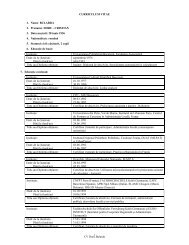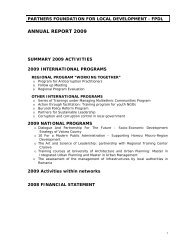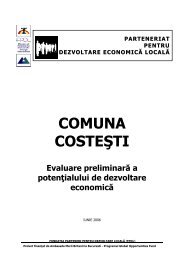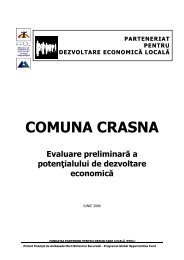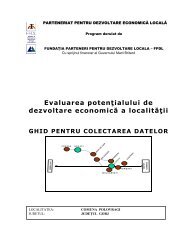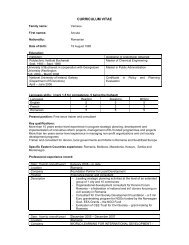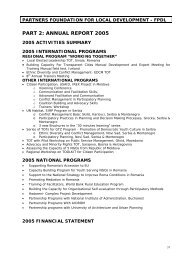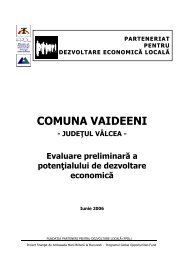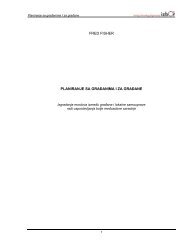Organizational Development: A Manual for Managers and ... - FPDL
Organizational Development: A Manual for Managers and ... - FPDL
Organizational Development: A Manual for Managers and ... - FPDL
You also want an ePaper? Increase the reach of your titles
YUMPU automatically turns print PDFs into web optimized ePapers that Google loves.
Only proper selection of members <strong>for</strong> the organization can change prevailing norms of this<br />
kind.<br />
Each individual in an organization has also a core of underlying values that contribute to his<br />
system of beliefs, ideas <strong>and</strong>/or opinions (see ‘value’ in semiotics) Integrity in the application of a<br />
"value" ensures its continuity <strong>and</strong> this continuity separates a value from a belief, opinion or idea. In<br />
this context, a value (e.g. ‘truth’ or ‘equality’ or ‘greed’) is the core from which we operate or react.<br />
Societies have values that are shared among many in the culture. Typically, individual values are<br />
largely, but not entirely, in agreement with cultural values.<br />
These values can be grouped into six categories:<br />
• Ethics (good - bad, virtue - vice, moral - immoral - amoral, right - wrong, permissible -<br />
impermissible);<br />
• Aesthetics (beautiful, ugly, unbalanced, pleasing);<br />
• Doctrinal (political, ideological, religious or social beliefs <strong>and</strong> values); <strong>and</strong><br />
• Innate/Inborn (inborn values such as reproduction <strong>and</strong> survival), <strong>and</strong> so on<br />
A values system is the ordered <strong>and</strong> prioritized set of values (usually within the ethical <strong>and</strong> doctrinal<br />
categories described above) held by an individual or a society. (see www.en.wikipedia.org)<br />
Since values are more attitudinal than behavioural norms, they do not fully determine behaviour;<br />
but they do create boundaries <strong>for</strong> behaviour - within a certain acceptable scope of action that does<br />
not contradict the values - though these boundaries are not necessarily defined by obligatory<br />
behavioural norms. Thus a value system may go through similar stages of development <strong>and</strong> can<br />
be seen as a kind of meta-system with respect to behavioural norms. If culture is a kind of shared<br />
knowledge about ‘the right way to do things around there’ - then a values system serves to find ‘the<br />
right way’, when it is not given in explicit <strong>for</strong>m. Values give criteria. When there is no <strong>for</strong>mal<br />
requirement or clear cultural norm to help decide between alternative actions (i.e. something new<br />
has happened) – then values help to make the right decision. There<strong>for</strong>e, the importance of a<br />
values system is rising drastically in the modern world. The corresponding role of a manager is<br />
also becoming more important. This was well described by Ralf Brody (with some references to<br />
Shein).<br />
Usually, cultural values develop over a long period of time, serve to stabilize the group, <strong>and</strong> are<br />
highly resistant to change. Frequently, these values are taken <strong>for</strong> granted <strong>and</strong> may not even be<br />
part of staff’s conscious thought process. … Effective managers can work with staff to crystallize a<br />
<strong>for</strong>mal values statement to help guide the work of an organization. …Effective managers serve as<br />
the primary shapers <strong>and</strong> communicators of organizational values. They influence the<br />
organizational culture by what they pay attention to, measure, <strong>and</strong> control; how they h<strong>and</strong>le crises<br />
135



